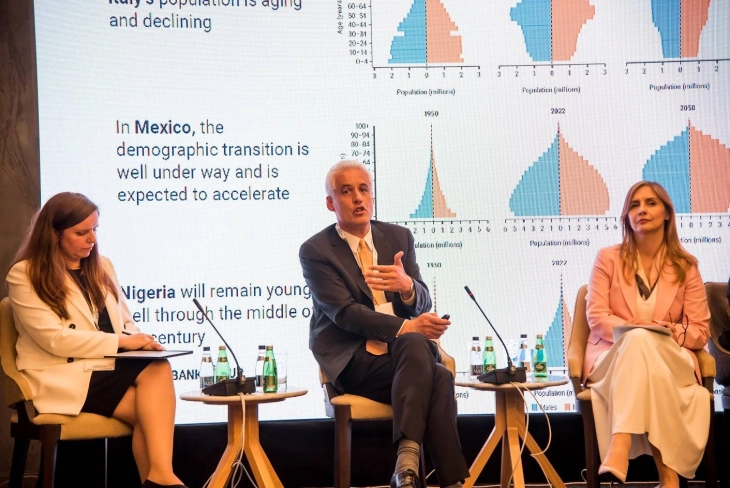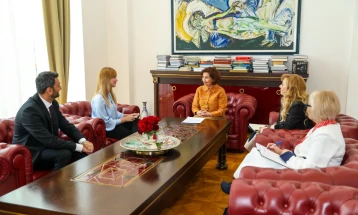Angelovska-Bezhoska: Policy makers can mitigate negative impacts of emigration
- Human capital is a prerequisite for achieving sustainable and inclusive economic growth, while emigration is one of the factors affecting human capital. With the reduction of both the quantity and the quality of the working population, considering that one third of the emigration in the region has higher education, the potential for growth of the economies is reduced and the already low convergence of income is slowing down, the income in the region is only 40% of European income, said National Bank Governor Anita Angelovska-Bezhoska at the annual meeting of the Belgian-Dutch Constituency of the International Monetary Fund and the World Bank, being held in Tivat, Montenegro.
- Post By Silvana Kocovska
- 13:04, 27 May, 2023

Skopje, 27 May 2023 (MIA) - Human capital is a prerequisite for achieving sustainable and inclusive economic growth, while emigration is one of the factors affecting human capital. With the reduction of both the quantity and the quality of the working population, considering that one third of the emigration in the region has higher education, the potential for growth of the economies is reduced and the already low convergence of income is slowing down, the income in the region is only 40% of European income, said National Bank Governor Anita Angelovska-Bezhoska at the annual meeting of the Belgian-Dutch Constituency of the International Monetary Fund and the World Bank, being held in Tivat, Montenegro.
Addressing the panel discussion “Emigrants, Refugees and Societies,” Angelovska-Bezhoska said that policy makers cannot prevent emigration completely, but they can mitigate the negative impacts, the National Bank said in a press release.
Angelovska-Bezhoska pointed to the slow convergence of the Western Balkans region towards the EU, which can mainly be attributed to structural issues, with the region's growth potential in the past two decades decreasing from 5% to 2.5%, which is sharper decline compared to the EU.
“This is due to unfavourable trends in all drivers of economic growth, including human capital. The quantity of human capital is decreasing, because of demographic factors, but also emigration. As a result, the percentage of the working-age population in the region has decreased from 70% to 65% in the past decade, while the World Bank expects that in the next two and a half decades it will decrease to 60%. At the moment, every fifth citizen born in the region lives abroad, while every third is thinking of emigrating,” Governor Angelovska-Bezhoska said.
In terms of the quality of human capital, as she stated, a third of the workers who emigrate are highly skilled workers, which affects both the current situation and the future movements of the labour market and further emphasizes the existing challenges.
“Overall, emigration slows down the growth and development of the region, which is also discussed by some analyses, according to which if the effect of emigration did not exist, the gap in the growth potential in the region would be smaller by two percentage points compared to the EU,” the Governor said.
According to Angelovska-Bezhoska, in order to reduce emigration, structural and institutional policies are needed to increase income and quality of life in the region, as this is one of the key factors for migration.
“At the same time, it is necessary to increase the utilization of the human potential that we have by increasing the life expectancy of the population, which lags behind the European average, by increasing the activity rate, especially of women and young people, as well as by improving the quality of the workforce through policies to improve the educational process. The improvement of the institutions, the conduct of appropriate economic policies and the strengthening of ties with the diaspora, can have positive effects and contribute to the return of a part of the emigrants, as well as to attracting new workers from other regions,” Angelovska-Bezhoska said.
Despite the mostly negative context of emigration, it also brings certain benefits, primarily financial, considering the remittance flows, which in the region amount to 10%, while in our country amount 15% of GDP, she added.
The Minister of Finance of Georgia, the Minister of Finance of Ukraine, the Deputy Minister of Finance of the Netherlands and the Director at the World Bank, Xavier Devictor also spoke at the panel discussion.
On the sidelines of the Constituency meeting, North Macedonia’s delegation met with World Bank Vice President for Europe and Central Asia, Antonella Bassani, IFC's Vice President for Europe, Latin America and the Caribbean, Alfonso Garcia Mora and the Alfred Kammer, Director of the IMF European Department, reads the press release.
Photo: National Bank







